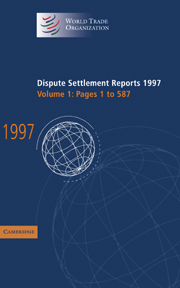Book contents
- Frontmatter
- Contents
- Japan – Taxes on Alcoholic Beverages, complaints by the European Communities (WT/DS8), Canada (WT/DS10) and the United States (WT/DS11) Award of the Arbitrator under Article 21.3(c) of the DSU
- United States - Restrictions on Imports of Cotton and Man-made Fibre Underwear, complaint by Costa Rica (WT/DS24): Report of the Appellate Body
- United States - Restrictions on Imports of Cotton and Man-made Fibre Underwear, complaint by Costa Rica (WT/DS24): Report of the Panel
- Brazil - Measures Affecting Desiccated Coconut, complaint by the Philippines (WT/DS22): Report of the Appellate Body
- Brazil - Measures Affecting Desiccated Coconut, complaint by the Philippines (WT/DS22): Report of the Panel
- United States - Measure Affecting Imports of Woven Wool Shirts and Blouses from India, complaint by India (WT/DS33): Report of the Appellate Body
- United States - Measure Affecting Imports of Woven Wool Shirts and Blouses from India, complaint by India (WT/DS33): Report of the Panel
- Canada - Certain Measures Concerning Periodicals, complaint by the United States (WT/DS31): Report of the Appellate Body
- Canada - Certain Measures Concerning Periodicals, complaint by the United States (WT/DS31): Report of the Panel
Brazil - Measures Affecting Desiccated Coconut, complaint by the Philippines (WT/DS22): Report of the Panel
Published online by Cambridge University Press: 22 December 2017
- Frontmatter
- Contents
- Japan – Taxes on Alcoholic Beverages, complaints by the European Communities (WT/DS8), Canada (WT/DS10) and the United States (WT/DS11) Award of the Arbitrator under Article 21.3(c) of the DSU
- United States - Restrictions on Imports of Cotton and Man-made Fibre Underwear, complaint by Costa Rica (WT/DS24): Report of the Appellate Body
- United States - Restrictions on Imports of Cotton and Man-made Fibre Underwear, complaint by Costa Rica (WT/DS24): Report of the Panel
- Brazil - Measures Affecting Desiccated Coconut, complaint by the Philippines (WT/DS22): Report of the Appellate Body
- Brazil - Measures Affecting Desiccated Coconut, complaint by the Philippines (WT/DS22): Report of the Panel
- United States - Measure Affecting Imports of Woven Wool Shirts and Blouses from India, complaint by India (WT/DS33): Report of the Appellate Body
- United States - Measure Affecting Imports of Woven Wool Shirts and Blouses from India, complaint by India (WT/DS33): Report of the Panel
- Canada - Certain Measures Concerning Periodicals, complaint by the United States (WT/DS31): Report of the Appellate Body
- Canada - Certain Measures Concerning Periodicals, complaint by the United States (WT/DS31): Report of the Panel
Summary
INTRODUCTION
On 27 November 1995, the Philippines requested consultations with Brazil under Article XXIII:1 of the General Agreement on Tariffs and Trade 1994 (“GATT 1994”) concerning the countervailing duty imposed by Brazil on imports of desiccated coconut from the Philippines. (WT/DS22/1/Rev.1).
On 8 December 1995, Brazil replied that it was prepared to enter into consultations with the Philippines as long as it was mutually understood that those consultations would be undertaken exclusively under the 1979 Agreement on Interpretation and Application of Articles VI, XVI and XXIII of the General Agreement on Tariffs and Trade (“Tokyo Round SCM Code”), under the auspices of which Brazil conducted the coconut subsidies investigations and imposed the countervailing duties.
On 13 December 1995, the Philippines replied that Brazil's response constituted a refusal of the request for consultations under Article XXIII:1.
Taking the view that Brazil had failed to enter into consultations within the period provided for in the Understanding on Rules and Procedures Governing the Settlement of Disputes (“DSU”), the Philippines, on 17 January 1996, requested the establishment of a Panel with standard terms of reference, pursuant to Article XXIII:2 of GATT 1994 and Articles 4.3 and 6 of the DSU. (WT/DS22/2).
At Brazil's request, a copy of document SCM/193, on the issue of the countervailing duties in question, was circulated to the Dispute Settlement Body (“DSB”). In that document, Brazil stated its view that the Tokyo Round SCM Code was the only legal framework applicable to the dispute. Brazil also indicated its understanding that the DSB was not the appropriate forum for the discussion on the dispute with the Philippines, and that document SCM/193 was circulated for information purposes only and without prejudice to its rights under the Tokyo Round SCM Code and to its position on the applicable law. (WT/DS22/3, attached as Annex 1).
At the 31 January 1996 meeting of the DSB, the Philippines stated that, for reasons mutually agreed to, the Philippines had not objected to postponing consideration of its request for establishment of a panel, but would make a statement at the next meeting of the DSB when this request would be considered.
- Type
- Chapter
- Information
- Dispute Settlement Reports 1997 , pp. 189 - 322Publisher: Cambridge University PressPrint publication year: 2000



